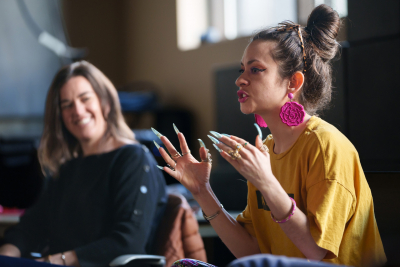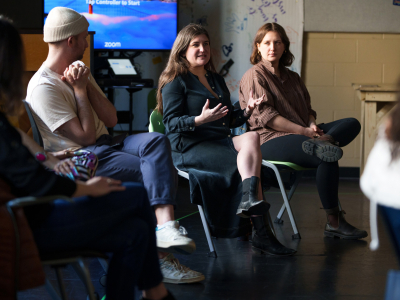Visiting Artists Fake Friends Collaborate With Students on New Work Devised at Duke

It’s a busy week for Brooklyn-based theater and digital media production company Fake Friends. They began a two week artist residency at Duke on February 20, then made a whirlwind return to New York on February 27 to attend the 66th annual Obie Awards, where they accepted a Special Citation in the Digital+Virtual+Hybrid Production category for Circle Jerk, a 2021 Pulitzer Prize Finalist in Drama.
Now back on campus, Fake Friends’ members Michael Breslin, Cat Rodríguez, Ariel Sibert and Zoe Mann are visiting acting classes and working with Duke students in the Department of Theater Studies to devise Bikini, a new production that weds modern female bodybuilding culture and Flaubert’s 19th century novel Madame Bovary.
If this seems like an odd mashup, it’s all in a day’s work for Fake Friends. The group delights in mixing pop culture with high culture, creating unsettling comedic productions that leave audiences off-balance.
“In Bikini, we’re trying for an exploration of a female bodybuilder’s character that is daring, mischievous, and honest,” says Breslin, Fake Friends’ co-creative director and a founding member of the group. Breslin read Bovary when he was an undergraduate at Hamilton College and was taken with the novel’s “embodiment of passion.” When Fake Friends began thinking of a new work involving a female bodybuilder, Breslin knew the central character needed a dramatic storyline. Bovary clicked perfectly.
How these disparate elements will come together is part of the work’s devising, which involves the participation of Duke students. Unlike a play written by a single individual, devising a new theater piece is a collaborative process that involves improvisation, experimentation, and play. In Blair Cadden's acting class, Fake Friends lead the students through an exercise that introduces them to the devising process.
Breslin breaks the students into pairs and tasks them with finding a short TikTok video, instructing them to learn the video’s choreography in as much detail as possible. As the students mime the actions of their videos, the members of Fake Friends encourage them to add their own dialogue, slow down their movements, and exaggerate gestures. There’s a lot of laughter in the room, and the results are impressive for such a short exercise. The students begin to see how they are co-creators of something entirely new, born out of a simple game.
“We need to play in our work,” says Ariel Sibert, Fake Friends’ dramaturg. “You can’t be silly in neuroscience class, but you can be here. It’s exciting to see how responsive Duke students are.”
Fake Friends and students in the Department of Theater Studies will present a workshop performance of their work-in-progress, Bikini, on Friday, March 3 at 5 pm in Sheafer Lab Theater, Bryan University Center. The workshop performance is free and open to the public. This project is also supported by the Sundance Institute Latine Fellowship.



